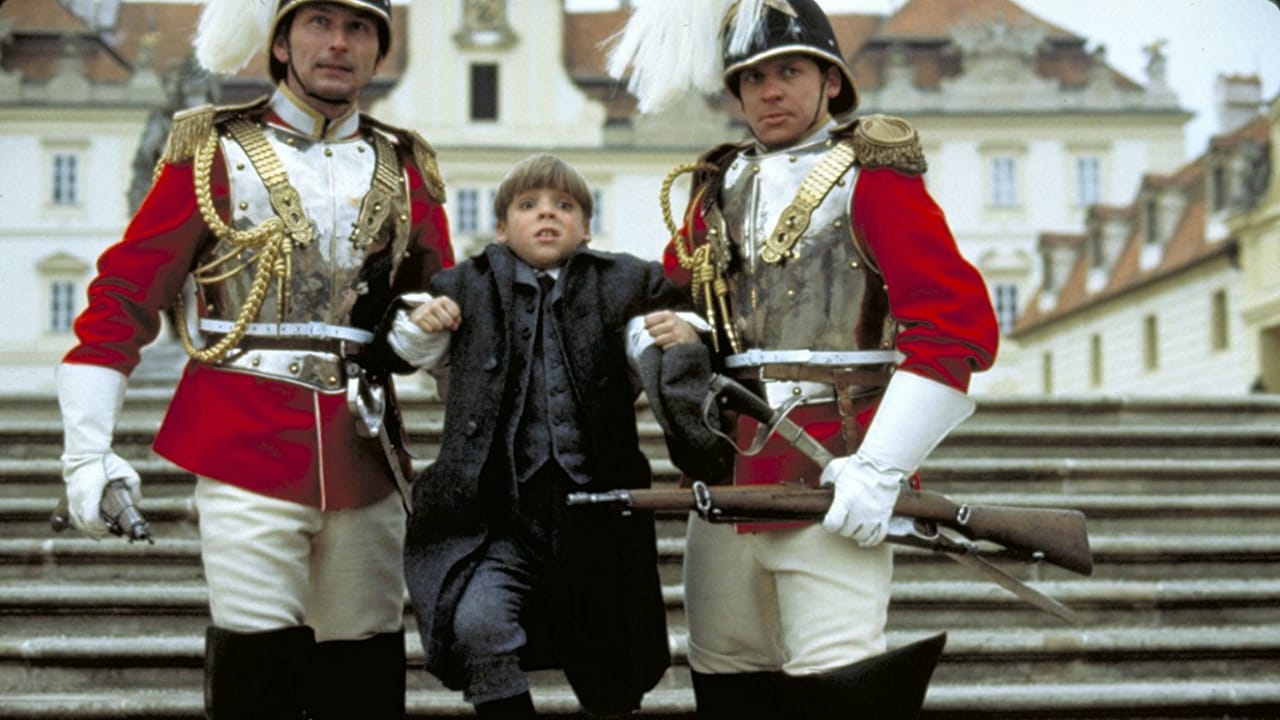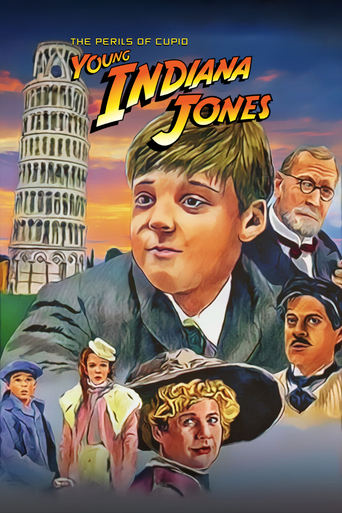

These are curious Young Indy episodes because two 45-minute TV shows from 1993 are spliced together here for a single, 90-minute adventure in love.Corey Carrier, about 12 during filming, is young Henry 'Indiana' Jones, Jr. He, his tutor, and his mom are traveling through Europe with the famous dad. This movie about love takes place in Vienna and in Florence.In Vienna young Indy gets exposed to the new theories of Freud and Jung over dinner, and he tries to discover what love really is. He has been smitten by the young princess of Austria, a girl his age that he met when both were at a riding school. This episode shows that Indy's characteristics we see manifest in the adult Indy, played by Harrison Ford, were already being honed. As an example, when he was denied the opportunity to tell the young Princess goodbye before they parted, young Indy sneaked into the royal compound, eluded guards, and went into a window to tell her goodbye. The second half bridges nicely onto this theme of love, as young Indy's mom in Florence meets Puccini while dad has to travel to another city for a few days. She is flattered by the attention, but when Puccini tells her he has fallen in love, he can't live without her, she must take the train at night and run away with him, she becomes very conflicted. But the tutor, and older and wiser woman, gets her to think about her husband and her son, and in the end she does the right thing. This is a very entertaining and watchable movie.
... View MoreIn this episode Indy first visits Vienna, where he is attending the Spanish Riding School. Besides the geographical and a few historical faults (I am from Vienna), it is a nice story. Indy falls in Love the first time in his life. Romantic and sweet. One of the funnier parts is the dinner, where Sigmund Freud, Carl Gustav Jung and Albert Hofmann (he discovered LSD) dine with the Jones family and discuss matters of "Love" with young Henry. It is deep and corny at the same time. But the three psychologists are not only played well (Freud the constant Bigtalk explaining his sexual-repression-thing and unease's the women; Jung, who fights with Freud and is more analytical abstract then Freud; and last but not least, the quiet and calm Hofmann, who, when speaking, punctuates), but also make this part really interesting.The second part, which is a little bit off the time-line (as someone commented before) plays in Florence and the family Jones meets the opera composer Puccini. Indy sees his first opera and is really drawn into it. From this moment on in, the whole film turns into a Puccini opera. Not only the music, but also the story, the cuts, the whole makeup of the second part of this episodes seems to be itself a Puccini opera. I always had the impression, that it is, because this is how Indy remembers the story. After all, all stories seem to be the things old Indiana (as it's a running gag in the later Episodes, where Indy always tells stories to random people) remembers. Actually the whole Series has this flair and I always believed, that the reason why "old Indy" does not show up in the episodes of the very young Indy is, because he does not remember these stories as consciously as he does with the ones he is a little bit older in. If you like opreas, take a look at this one. If not, watch it anyway and try to see the hidden parts.While opera is not for everyone and the story puts Indy in the position of second cast and removed the adventure elements, I think, that for a series, this episode is rather deep. Maybe too deep for what the general audience might want to see when they watch Indiana Jones. For me it adds real heart and shows the amount of subliminal and fine conceptions went into this series, as it happens with a lot of films George Lucas works on.
... View MoreYoung Indy travels to Austria with his parents where he meets Princess Sophie at a riding stable and falls madly in love when they sneak off for the afternoon. But her parents are furious and forbid them to see each other again. After taking dodgy advice from none other than Sigmund Freud Indy runs off to proclaim his love before leaving forever.It's sweet but barely holds the attention past the love story. The second half of the movie is inexcusable though as the Jones' travel to Florence where opera composer Giacomo Puccini falls in love with Indy's mother while Henry Jones Sr. is out of town. The following story of 'will she or won't she cheat' is certainly NOT what I want to see while watching an Indiana Jones adventure. There are plenty of crappy soap operas for that kind of stuff. I can't believe that Mike Newell (Goblet of Fire, Donnie Brasco) directed this.Watch only if your are an Indy completest or a sado-masochist.
... View MoreThis third chapter sees Indiana Jones falling head over heels for the first time - at age 10. And with Sophie, an Austrian princess, no less. Though the romance is doomed from the start and the pair of them are really far too young to even consider such feelings, she does present him with a locket that the teen-aged Indy (Sean Patrick Flanery) can be seen wearing in many subsequent episodes of the The Adventures of Young Indiana Jones (formerly known as the Young Indiana Jones Chronicles). In fact, in the original broadcast order, the locket had already saved the young adventurer's life at the start of 'German East Africa, December 1916'/'Oganda, the Giver and Takef of Life' long before 'Vienna, November 1908' hit the airwaves.The first half of 'Perils' is one of two Young Indy adventures directed by Swedish director Bille August. Both of them featured his wife Pernilla (aka Shmi Skywalker) in supporting parts and a great deal of Swedes to work in front of and behind the camera (though the story is actually set in Austria). Most prominently amongst them is Max Von Sydow, who gets a rare supporting part with actual substance as Sigmund Frued. For Star Wars fans there is another familiar face to look out for: Bruce (General Rieekian) Boa in a blink and you'll miss him bit part. It also features the first chronological use of Indiana's catchphrase 'Trust me'.As usual, the bookends featuring George Hall as 94 year old Indy have been cut, meaning some helpful exposition is missing. Originally, the old man mentioned that his father was there to attend the world's first psycho-analytical conference in Vienna. Without this explanation, Sigmund Freud, Carl Jung and Alfred Adler seem to all attend the same diner party by pure happenstance. Also, at the end of the story, ancient Indiana hinted at another meeting between Princess Sophie and himself. But unfortunately this follow up story never saw production. 'Viena' was a first season episode that got pushed back to the second season in the states and is here combined to form 'The Perils of Cupid' with 'Florence, May 1908' (which was part of the second season shoot). Never mind that the chronology has been changed, both episodes share the theme of love. In 'Florence', it is Indy's mother who is being wood by Italian opera composer Giacomo Puccini. This part marks the first of only two occasions Ruth de Sosa, as Anna Jones, actually gets to do more than just follow young Indy around in the far background. Strangely enough, this time it is Indy himself who remains almost completely unaware of what's happening to his mom and the fact she is considering leaving her husband and child for the persuasive Puccini (romantically played by George Corraface).When experiencing 'Perils of Cupid' as a whole, it seems young Indy simply forgets about his infatuation with the princess and all he's learned about love from Freud and co and becomes obsessed with studying the laws of physics. This is exactly where George Lucas' plan of shooting and broadcasting a historical series out of order begins to show it's biggest flaw: it is impossible to keep the continuity straight when you keep inserting new episodes into an already crowded time line. The tight continuity there was between the first season episodes (which were planned and written well in advance) became muddled during the second series when new stories were added to continuity. Once again it is up to the main guest star (in this case Corraface) to breathe life into the story and have the viewer get caught up in the romance to such an extend that they forget about nit-picking. But in the case of 'Florence', the story premise itself is working against the viewers enjoyment of the piece: how can one root for Anna when she is contemplating to leave her husband? Both of the stories that make up 'Cupid' are about as far removed from the familiar adventures of Indiana Jones as possible. George Lucas wasn't kidding when he announced this series to be different. He also wasn't joking about it being educational, as the principles of physics, opera and love are all crammed into one small package. Young Indy, in all it's many forms is an interesting experiment, but if this chapter had not been part of a boxed set, chances are it would have been an extremely slow seller.7 out of 10
... View More